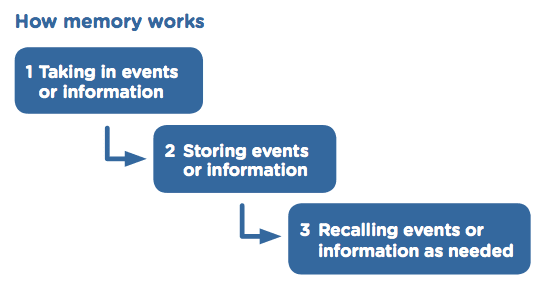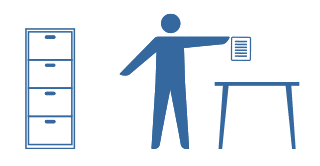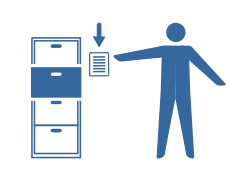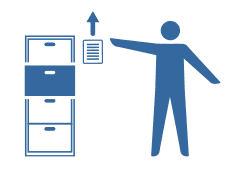
Get the booklet
Download Living with Changes in your Memory in pdf format

Memory is our ability to take in information and events, to store them and recall them in the future.
Memory is a complex process that goes on in the brain. Difficulties with memory are common following a brain injury. The difficulties can vary from person to person. The same problem can affect different people in different ways.
As well as your brain injury, many things can affect your memory — these include tiredness, hunger, stress, your mood, pain, other illnesses and medications.
Here, we focus on memory problems in everyday life and make practical suggestions you can try. The suggestions are based on research and people’s own experiences.
Because everyone’s brain injury affects them slightly differently, some of the suggestions will work for you – others won’t. Try them out and use the ones you find helpful.
How memory works
You may think of a memory as an event you either remember or you don’t. In fact, memory is a process that involves many different parts of the brain working together.
There are many different types of memory – for example: our memory for faces, for things we see and events that happen; the memory we use for remembering facts, and the memory we have for things we know how to do.
The way memory works is very complicated. To make it more straightforward, we will look at memory as having three steps:
1. Taking in information and events,
2. Storing information and events and
3. Recalling the information and events later.

Think of memory as similar to using a filing cabinet:
- Taking in
information or events is like picking up files you are going to put in a cabinet. - Storing
information or events is like putting the files in the cabinet to keep them safe. - Recalling
information or events is like taking the files out of the cabinet again.
How a brain injury affects memory
A brain injury can affect one or more of these steps:
| Taking in | The person can take in information and store it. The memory is made but they have a difficulty recalling it from storage. The person may be able to remember the information if someone gives them a hint or prompt. |
| Storing | The person can take in information and store it. The memory is made but they have a difficulty recalling it from storage. The person may be able to remember the information if someone gives them a hint or prompt. |
| Recalling | The person can take in information and store it. The memory is made but they have a difficulty recalling it from storage. The person may be able to remember the information if someone gives them a hint or prompt. |
You may not know which of the three steps is affecting your memory — taking in, storing or recalling. Some people have difficulties with more than one of the steps.
If you would like to find out more about your particular memory difficulties, a Psychologist or Occupational Therapist can advise you. See Help and information tab below for contact details.
If you often forget things when you are leaving the house, use a checklist of things to do and bring.
Leave items like shopping bags or clothes for dry-cleaning beside the front door to remind you to take them with you.
Memory terms explained
Here is a brief explanation of some memory terms you may have heard since your brain injury:
Amnesia means ‘loss of memory’. It comes from the Greek word for forgetfulness.
Retrograde Amnesia is a loss of memory for events before a brain injury.
Anterograde Amnesia is a person’s inability to make new memories after a brain injury.
Post Traumatic Amnesia is the period of confusion which happens in the early stages of recovery after a brain injury. In most cases, Post Traumatic Amnesia passes when your brain has recovered enough to make sense of what is happening.
Short Term Memory is your memory for things in the very recent past. Experts have different opinions on what exactly Short Term Memory is.
In the context of brain injury, it is most useful to think of Short Term Memory as the way we make new memories.
Long Term Memory is the brain’s system for storing information for long periods of time. We store things that happened weeks, months and even years ago, in our long-term memory. Then, we can recall them when we need to.
What you can do

General advice
| Get into a routine | Get into a routine of doing the same things at the same time every day, so that things become a habit and are easier to get done. |
| Re-organise your home | Having your house well-organised means you will not need to rely on your memory so much. For example: have one place in the kitchen to put your keys and phone when you come in. |
| Use tools to aid your memory | Practical tools can make it easier for you to remember appointments and the things you need to do. Examples are: lists, wall calendars, mobile phones, diaries, notebooks and Post-it notes. |
| Improve your general well-being | Eating healthily, exercising, getting enough sleep, and learning to cope with stress and mood changes, can all have a positive effect on your memory. |

Tools to aid your memory
| An organiser | Using an organiser can help. You can get a My organiser from Headway. It includes a Diary, a Day Planner, a Task Planner and an Appointment Planner. Phone Headway on t: 1800 400 478 to get one. |
| Diary | Put your appointments into your diary or your phone. Note the date and time, who you are meeting and where. Get into the habit of checking every morning to see what is coming up that day |
| Wall Calendar | Use a wall calendar, as well as a diary or phone, to keep track of your appointments. The calendar will also be helpful to other people who need to know what you have planned |
| Electronic Calendar | All smart phones and computers have electronic calendars now. You can use the electronic calendar to set reminders for appointments and events. Try free services such as iCloud or OneDrive. If you use a service like this, your phone’s calendar and contacts will be kept safe even if you lose your phone or get a new one. |
| Alarms and timers | Use your phone alarm or a timer to remind yourself of things you need to do every day, such as taking tablets. Alarms and timers are also handy for cooking or if you are taking a rest during the day. |
| Managing Bills | Set up your household bills for automatic payment by Direct Debit. This will save you having to remember them. If you are not paying by Direct Debit, pay the bill on the day you receive it or put a reminder in your phone or diary when to pay it. When you pay a bill, write the date it was paid on it. Then put the bill away in a file or folder |
| Notebooks | Use a notebook or diary to write down important information during appointments. Put a notebook beside the home phone for messages. |
| Lists | To-do Lists: Write down a list of things you want to do each day or put them into your phone. Put the most important things first. Tick the items off as you finish them. Shopping Lists: Keep a notepad for shopping lists handy. Then you can add items to the list as soon as you think of them. Checklists: Write a list of things you need to do to complete a task and tick them off. For example — when leaving the house: 1. Close any open windows. 2. Lock back door. 3. Get phone, keys and bag. 4. Set house alarm. 5. Lock front door. |
I have to say I was quite frustrated and embarrassed about my memory. But when I went back to work, I told my colleagues that my short term memory wasn’t great anymore. Most of them have been good and remind me to take notes so I don’t forget things I have to do.
Trisha from Dublin

If you keep your wall calendar, notebooks and to-do lists, all in the one place, you will not have to go looking for them when you need them.

Tips for common situations
| To remind yourself of what happens at appointments | Explain you have a memory difficulty so you need to record notes in a notebook on your phone or on a Dictaphone. or Ask the doctor to write down the important points. or Bring a family member or friend to take notes At the end of the meeting, check with the doctor that what has been noted is accurate |
| If you cannot remember how to get to somewhere: | Get a printed map of the route you want to re-learn. Highlight key landmarks and mark the route in colour. or Use the map on your smartphone to guide you until you get used to the route again. Ask someone to come with you the first few times if that makes you feel more confident |
| If you cannot remember what you did recently: | Go back over your phone calendar or diary. This can help to remind you what you have been doing. Take photos on your phone and look back at them later |
| If you find it difficult to remember information you read | Divide the information into smaller sections. Read over each section a few times. Write down the main points or use a highlighter pen. Some people find drawing a ‘Mind Map’ of important points helps them remember |
| To help remember people’s names | When someone new introduces themselves, try using their name a few times during the conversation. Repeating someone’s name like this may help you remember it. The next time you meet the person, if you can’t remember their name, silently go through the letters of the alphabet. This may help trigger your memory |
| If you put things down and forget where they are | Get into the habit of having one place in the house that you always put your keys, phone, handbag or wallet when you come in. You can also buy electronic trackers to help you find misplaced phones or keys. Do a search on the internet for ‘lost item finders’ to get more details and suppliers |
| To make sure you pass on phone messages | Keep a notebook beside the phone for messages. or Text the message to the person straight away |
| To remind yourself to take your tablets | Ask your pharmacist to put your tablets in a free 14 blister pack. The blister packs clearly show which tablets to take each time. Then, set an alarm on your mobile phone, or clock, for the times you need to take your tablets |
| If someone does not understand why you are forgetful: | Explain you have a brain injury that affects your memory. Suggest to family and friends to read this section of our website too |
Summary of key points
- Memory is a complex process that uses different parts of the brain.
- Many people have memory difficulties after a brain injury.
- While there are no quick fixes for memory difficulties, there are practical things you can do to work around them.
- A Psychologist, or Occupational Therapist, can assess your memory to see where exactly your difficulties lie and what approaches will help the best.
- Being open and honest about your memory problems can help other people understand better what you are dealing with.
Help and information
Information
Visit www.headway.ie/about-brain-injury to:
- Read more booklets in the Brain Injury Series.
- For further information and where to get support.
- For ways to connect with other people living with a brain injury
Psychologists
Headway offers free community-based brain injury assessment, counselling and rehabilitation in Cork, Dublin, Kerry and Limerick. t: 1800 400 478 or visit www.headway.ie.
To access a public psychologist, your GP or Public Health Nurse can refer you. HSE t: 1800 700 700 or visit www.hse.ie
To find a registered private psychologist, contact the Psychological Society of Ireland. t: 01 472 0105 or visit www.psychologicalsociety.ie
Occupational Therapists
To access a public Occupational Therapist, contact your local HSE Health Office or Health Centre. HSE t: 1800 700 700 or visit www.hse.ie
To find a private Occupational Therapist, contact the Association of Occupational Therapists of Ireland. t: 01 874 8136 or visit www.aoti.ie.


